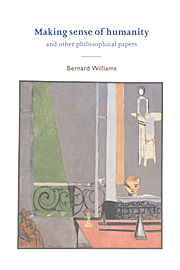Book contents
- Frontmatter
- Contents
- Preface
- I Action, freedom, responsibility
- 1 How free does the will need to be?
- 2 Voluntary acts and responsible agents
- 3 Internal reasons and the obscurity of blame
- 4 Moral incapacity
- 5 Acts and omissions, doing and not doing
- 6 Nietzsche's minimalist moral psychology
- II Philosophy, evolution, and the human sciences
- III Ethics
- Index
5 - Acts and omissions, doing and not doing
Published online by Cambridge University Press: 28 January 2010
- Frontmatter
- Contents
- Preface
- I Action, freedom, responsibility
- 1 How free does the will need to be?
- 2 Voluntary acts and responsible agents
- 3 Internal reasons and the obscurity of blame
- 4 Moral incapacity
- 5 Acts and omissions, doing and not doing
- 6 Nietzsche's minimalist moral psychology
- II Philosophy, evolution, and the human sciences
- III Ethics
- Index
Summary
Preliminaries
In a famous and strongly argued essay, Philippa Foot sought to explain a range of widely held moral beliefs, including some about abortion, partly in terms of a distinction between doing and allowing. Her article was not primarily directed to the analysis or explication of the distinction itself, though she was careful to separate it from some other distinctions that resemble it and perhaps overlap with it; she was concerned, rather, with organizing moral beliefs around it. In the enormous literature on these subjects, there is a rough distinction between writers who have been mainly concerned with the ethical application of such distinctions, and others who have been more interested in them as part of an attempt to understand the structure of action and action-ascriptions. Few writings fall unequivocally, of course, into one of these classes or the other. Many of them belong to what might be called ‘applicable philosophy’ – the kind of analysis that treats distinctions in the philosophy of mind or action for their own interest, but keeps in mind their ethical relevance. This chapter is intended to be of that sort. Since distinctions do not exist in a vacuum, it may well be the potential moral interest of a distinction that motivates the attempt to make it out, but ‘applicable’ philosophy of action does stand a step further away from the exchange of moral intuitions than the other type of discussion does.
There is more than one kind of ethical relevance, and this is one reason why even the less directly ethical discussions of these notions may be ethically relevant.
- Type
- Chapter
- Information
- Making Sense of HumanityAnd Other Philosophical Papers 1982–1993, pp. 56 - 64Publisher: Cambridge University PressPrint publication year: 1995
- 3
- Cited by



